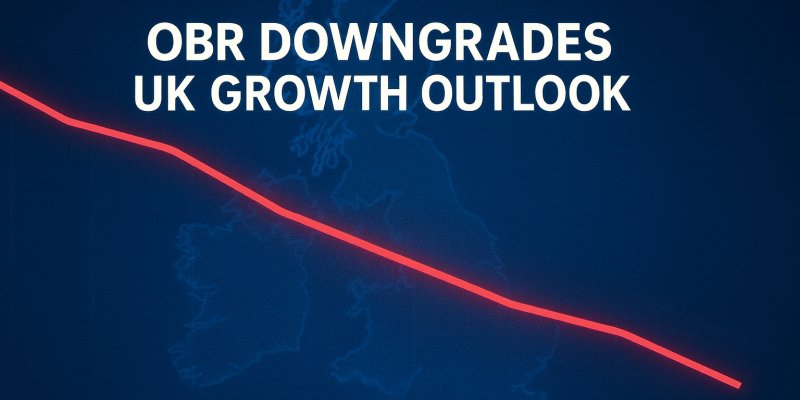
The UK’s influential fiscal watchdog has raised its 2025 growth outlook, but issued a stark downgrade for the rest of the decade.
The Office for Budget Responsibility now sees GDP growing 1.5% in 2025, but only 1.4% in 2026 (cut from 1.9%), 1.6% in 2027 (vs 1.8%), and just 1.5% in both 2028 and 2029 (vs 1.7% and 1.8%).
The new forecasts landed as Chancellor Rachel Reeves delivered her Budget speech, raising questions about the economy’s future direction at a delicate political moment.
The seriousness of the downgrade goes beyond the numbers.
It narrows fiscal headroom, the cushion Reeves needs to meet her own rules and fund priorities, and undermines the argument that next year’s recovery signals a new era of prosperity.
This report weighs what the OBR’s changes mean for jobs, investment and inflation, setting these factors against Reeves’ new tax and spending choices.
OBR downgrade: the numbers and the economic hit
The OBR forecasts UK GDP will grow by 1.5% in 2025, but has downgraded growth thereafter: 1.4% in 2026 (down from 1.9% in March), 1.6% in 2027 (vs 1.8%), 1.5% in 2028 (vs 1.7%) and 1.5% in 2029 (vs 1.8%).
That drop: 0.4 to 0.5 percentage points each year, adds up, since even small changes in the economic trend can shave billions off future tax revenues.
A smaller tax base means the UK will face higher debt as a share of GDP over time, making public finances more fragile just as ageing, climate and global shocks put pressure on budgets.
OBR officials said the downgrade mainly reflects persistent weakness in business investment and productivity, plus the ongoing drag of higher interest rates.
The Institute for Government’s economist noted that this is less about a cyclical blip and more a structural reality the UK must confront.
Headline inflation is projected to fall back to 2% in 2027, but public sector borrowing will now average over £70bn per year during 2026-29, higher than forecast in March.
Tax moves, headroom and spending: what Reeves announced
Rachel Reeves’ Budget promised a “responsible path,” claiming £22 billion of fiscal headroom against the main target to get debt falling in five years.
However, that cushion now looks thinner with growth estimates lowered, as weaker GDP means less tax intake.
Reeves announced targeted investments in housing and green infrastructure, but balanced them with tax rises aimed at wealth, property and online gambling, alongside several tax freezes instead of outright cuts.
With the OBR downgrade, every fiscal move faces sharper trade-offs. Boosting investment could help growth, but risks widening the deficit if the returns are slow.
Reeves defended the Budget’s credibility, saying:
We’re keeping to the rules, focusing investment where it matters, and resisting unfunded giveaways.
Opposition MPs, meanwhile, say the downgrade exposes “over-optimistic plans and weak underlying fundamentals,” arguing families won’t feel better off even with a modest 2025 upturn.
Market reaction was calm, with sterling steady and gilt yields little changed, but analysts warned that “room for surprises, good or bad, is shrinking”.
The real test now will be whether these lower projections stick, how markets respond, and if Reeves can defend public services and deliver promised investments.
With potential departmental reviews ahead and further revisions possible in the next EFO, the debate over the UK’s economic trajectory is just getting started.
The post How serious is the OBR’s downgrade for the UK’s medium-term economy? appeared first on Invezz










